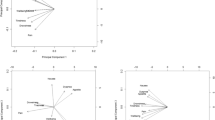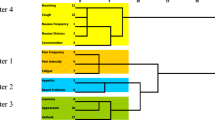Abstract
A major goal of palliative medicine is to control symptoms that interfere with quality of life. Identification of symptoms that occur together (cluster) may aid in symptom management, resulting in greater therapeutic benefit to the patient. An analysis of 25 symptoms from 922 patients with advanced cancer was undertaken to determine if symptom clusters could be identified. Cluster analysis was done using an agglomerative hierarchical method with average linkage; the absolute value of the correlation between pairs of symptoms was used as the measure of similarity. A correlation of ≥0.68 was used to define the final clusters. Seven clusters were identified: (1) fatigue: anorexia–cachexia; (2) neuropsychological; (3) upper gastrointestinal; (4) nausea and vomiting; (5) aerodigestive; (6) debility; (7) pain. Recognition of symptom clusters should help understand symptom pathophysiology and target therapies that perhaps can be used to relieve multiple symptoms in that cluster. This could result in improved quality of life for patients with advanced cancer and perhaps reduce polypharmacy, lessen drug side effects, and have pharmacoeconomic benefits.

Similar content being viewed by others
References
Curtis EB, Krech R, Walsh TD (1991) Common symptoms in patients with advanced cancer. J Palliat Care 7(2):25–29
Donnelly S, Walsh TD, Rybicki L (2000) The symptoms of advanced cancer: relationship to age, gender, and performance status in 1,000 patients. Support Care Cancer 8(3):175–179
Walsh D, Donnelly S, Rybicki L, Nelson K (2002) Symptoms and prognosis in advanced cancer. Support Care Cancer 10(38):5–8
Miaskowski C, Dodd M, Lee C (2004) Symptom clusters: the new frontier in symptom management research. J Natl Cancer Inst Monogr 32:17–21
Simel DL (2004) Approach to the patient: history and physical examination. In: Goldman A (ed) Cecil textbook of medicine, 2nd edn. Saunders, Philadelphia, PA, pp 18–23
Johnson RA, Wichern DW (eds) (1982) Applied multivariate statistical analysis. Prentice Hall, New Jersey
Kuiper FK, Fisher LA (1975) Monte Carlo comparison of six clustering procedures. Biometrics 31:777–783
Wieser HG (1983) In: Fischer G (ed) Electrical feature of the psychomotor seizure. Stuttgart and Butterworths, London
Bruera E, Chadwick S, Fox R et al (1987) Study of cardiovascular autonomic insufficiency in advanced cancer patients. Cancer Treat Rep 70:1383–1387
Komurcu S, Nelson K, Walsh D (2000) The gastrointestinal symptoms of advanced cancer. Support Care Cancer 9:32–39
Komurcu S, Nelson K, Walsh D, Donnelly S, Abdullah O, Homsi J (2000) Common symptoms in advanced cancer. Semin Oncol 27(1):24–33
Nelson KA, Walsh TD (1993) Metoclopramide in anorexia caused by cancer-associated dyspepsia syndrome (CADS). J Palliat Care 9(2):14–18
Nelson KA, Walsh T, Sheehan FG, O’Donovan PB (1993) Assessment of upper gastrointestinal motility in the cancer-associated dyspepsia syndrome. J Palliat Care 9(1):27–31
Walsh D (1997) Symptom control in advanced cancer. Proc Am Soc Clin Oncol 295–302
Homsi J, Walsh D, Nelson K, LeGrand S, Davis M (2000) Hydrocodone for cough in advanced cancer. Am J Hosp Palliat Care 17(5):342–346
Fleishman SB (2004) Treatment of symptom clusters: pain depression and fatigue. J Natl Cancer Inst Monogr 32:119–123
Kotagal P, Luders HO, Williams G, Nichols TR, McPherson J (1995) Psychomotor seizures of temporal lobe onset: analysis of symptom clusters and sequences. Epilepsy Res 20:49–67
Nagel GC, Schmidt S, Strauss BM, Katenkamp D (2001) Quality of life in breast cancer patients: a cluster analytic approach. Breast Cancer Res Treat 68:75–87
Hack TF, Degner LF (1999) Coping with breast cancer: a cluster analytic approach. Breast Cancer Res Treat 54:185–194
Dodd MJ, Miaskowski C, Paul SM (2001) Symptom clusters and their effect on the functional status of patients with cancer. Oncol Nurs Forum 28(3):465–470
Cleeland CS, Mendoza TR, Wang XS, Chou C, Harle MT, Morrissey M, Engstrom MC (2000) Assessing symptom distress in cancer patients. Cancer 89:1634–1646
Donnelly S, Walsh D (1995) The symptoms of advanced cancer. Semin Oncol 22(2):67–72
Donnelly S, Walsh TD (1995) The symptoms of advanced cancer in 1000 patients: identification of clinical priorities by assessment of prevalence and severity. J Palliat Care 11(1):27–32
Hammer J, Howell S, Bytzer P, Horowitz M, Talley NJ (2003) Symptom clustering in subjects with and without diabetes mellitus: a population-based study of 15,000 Australian adults. Am J Gastroenterol 98(2):391–398
Author information
Authors and Affiliations
Corresponding author
Additional information
A World Health Organization demonstration project in palliative medicine.
Rights and permissions
About this article
Cite this article
Walsh, D., Rybicki, L. Symptom clustering in advanced cancer. Support Care Cancer 14, 831–836 (2006). https://doi.org/10.1007/s00520-005-0899-z
Received:
Accepted:
Published:
Issue Date:
DOI: https://doi.org/10.1007/s00520-005-0899-z




